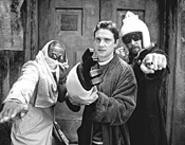Simpson, writing on the internet a few weeks ago, now thinks Adams got off lucky, since the author will never see how Disney bastardized his beloved child or hear his brilliant lines gutted and reduced to glib, soggy punch lines. "You just won't believe how vastly, staggeringly, jaw-droppingly bad it is," Simpson wrote, being most kind. Simpson, of course, comes to it from the perspective of the obsessive fan and distant friend, protective till the end of Adams' beloved work about the travails of the last Earthman, Arthur Dent, as he trips through space with aliens Ford Prefect and Zaphod Beeblebrox and Marvin the Paranoid Android. But he does indeed speak for those who adore the book not for the story (a narrative as linear as a soap bubble), but for Adams' zippy, witty writing style, which was Marx Brothers by way of Monty Python -- nonsense that made perfect sense to its acolytes. Anyone unfamiliar with the novel will simply be lost, a hitchhiker just trying to get a ride out of the theater.
The story, with some notable and pointless and absolutely confusing detours, remains the same: Arthur Dent (The Office's Martin Freeman) wakes up one morning to discover that his home is to be demolished and replaced by a bypass -- the same fate awaiting Earth that very morning, as it is to be blown up by aliens seeking a shortcut through space. Dent's rescued by his friend Ford Prefect (Mos Def), an alien who contributes entries to The Hitchhiker's Guide to the Galaxy, a sort of encyclopedia for space travelers that features on its cover the words "Don't Panic." Along the way, they encounter Ford's hippy-dippy "semicousin" and President of the Imperial Galactic Government, Zaphod Beeblebrox (Sam Rockwell), the lovely earthling Tricia "Trillian" McMillan (Zooey Deschanel), and the giant-headed, enormously depressed Marvin (voiced by Alan Rickman), who are traveling in a stolen spaceship to the mythical planet Magrathea, where they will find the question to which the answer is 42.
You could fill in more blanks, but why bother? Adams' story, which once went from here to there to way over there without much use for a map of any kind, was just a flimsy excuse upon which he hung his anarchic gags and ticklish jabs; Hitchhiker's Guide had a plot the same way Duck Soup had a plot. You reveled in the dialogue, the hysterical exchanges between Ford and Arthur, the lines that meant nothing but you kept in your head and heart as though you'd written them yourself. There are too many to quote, but among them is an alien guard's realization that "the hours are pretty good, but now you come to mention it, most of the actual minutes are pretty lousy" and Arthur's warning to Ford about the "infinite number of monkeys outside who want to talk to us about this script for Hamlet they've worked out." Those lines, and most every other one, have been chucked out into the choking void of outer space.
The screenplay is credited to Adams and Karey Kirkpatrick, who wrote Chicken Run and James and the Giant Peach; his are unimpeachable credits, alas. But Kirkpatrick and director Garth Jennings, a maker of music videos, have picked off the juicy meat and left only a bone for us to gnaw on. They've reduced mayhem to a polite, throat-clearing ahem, replacing the playful witticisms and nutty scenarios with more conventional sci-fi situations (there is even a Star Wars gag for you to gag on) and the pointless addition of a romance between Arthur and Trillian. The droll has been made dull, a most inexplicable and unfortunate turn of events for so adored a genius, goofball work as this.
M.J. Simpson is right: The work has survived this long precisely because of Adams' humor, as dry as an Englishman's toast; you wanted to turn the pages not to see what happened next, but to revel in the jokes that flew by like shooting stars. They're gone now, and in their place are characters who are meaner, dumber, blander, and far less funny, which takes the fun out of it altogether. Only Stephen Fry, as the voice of the guide itself, seems to be on the same page as Adams, but even he ruins the affair, talking and walking over jokes in the rush to explain things to newcomers while appeasing the true believers at the same time. It's a good thing that in space, no one can hear you snore.










